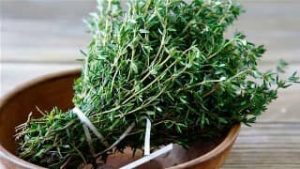Thyme Benefits - Cough, Herpes, Detoxify the Liver

Thyme is a condiment widely used in cooking along with bay leaves and other herbes de provence (mixture of dried herbs used for seasoning). But did you know that thyme is also a medicinal plant with many virtues, used in herbal medicine for hundreds of years ?
In this article, we will quote the medicinal properties of thyme currently recognized by the scientific community.
Botanical and Common Names of Thyme
Common thyme or cultivated thyme is a perennial and aromatic sub-shrub that belongs to the Lamiaceae family (basil, marjoram, mint, oregano, thyme and rosemary). The botanical name of common thyme is ‘Thymus Vulgaris ‘ and its common names are wild thyme or farigoule in Provence.
Thyme and Active Components of The Plant
Thyme contains an essential oil consisting of THYMOL and CARVACROL, caffeic and rosmarinic acid, tannins and flavonoids including apigenin(or apigénol), naringenin, luteolin (or luteolol) and thymonin. Thyme leaves are also rich in vitamins B1, C and magnesium.
5 Thyme Properties
1) Thyme and Antibacterial Properties
Several studies have confirmed the thyme’s antibacterial action against Gram positive and Gram negative-type pathogenic bacteria. These studies suggested the use of an antibiotic such as thyme.
Thymol is 25 times more efficient than phenol, a powerful antiseptic used in medicine, but less toxic. Carvacrol, meanwhile, prevents the growth of several strains of bacteria such as the coliform bacillus Escherichia coli (E.coli) and bacillus ‘Bacillus cereus’.
2) Thyme and Antiviral Virtues
Thyme is also a remedy against viruses. A thyme infusion is counted among the ‘grandmothers recipes’ known to fight against fever and flu viruses. Recently, science has begun to explore the antiviral properties of thyme. It turns out that thyme has antiviral properties against herpes simplex.
3) Thyme and Fungal Properties
Thyme is a powerful antifungal medicine. Its essential oil is often used for this purpose. Several studies have found that thyme essential oil is natural fungicide with a broad spectrum of action.
4) Thyme and Anti-inflammatory Virtues
A recent study indicated that thyme essential oil can reduce inflammation. The researchers compared the therapeutic effect of the thyme essential oil with six other essential oils, noting that thyme oil performs the most powerful anti-inflammatory action.
Indeed, it is capable of inhibiting an enzyme called Cyclooxygenase-2 or COX-2. When the Cox-2 enzyme is blocked, inflammation decreases. The essential oil of thyme plays the same role as Ibuprofen, a NSAID (non-steroidal anti-inflammatory) to treat pain and inflammation.
5) Thyme and Antioxidant Action
The flavonoids in thyme (apigenin, naringenin, luteolin and thymonine) in combination with vitamins and minerals, exert a powerful antioxidant effect. Antioxidants protect the cell from oxidation.
The Indications for The Use of Thyme in Alternative Medicine
1) Thyme against cough, bronchitis and sore throat
In 2007, German scientists conducted a study of 1,234 adolescents with acute bronchitis. They prescribed them a 100% natural syrup based on thyme and ivy for 10 days.
What did this clinical study reveal ? Symptoms in the young patients decreased significantly and for some, this phytotherapeutic (herbal) remedy completely cured them. In all of these adolescents, cough decreased 81.3% on the 10th day of treatment.
2) Thyme against oral and vaginal candidiasis
Candida albicans is a yeast species that can be responsible for gastrointestinal and gynecological fungal infections.
One study showed that the essential oil of thyme has a powerful ‘anti-candida action’ which allows it to treat oral or vaginal candidiasis naturally and effectively.
3) Thyme against herpes simplex
In vitro studies were conducted to evaluate the antiviral activity of thyme (and other species of the family Lamiaceae) on the type 1 and type 2 herpes simplex virus (HSV). Both herpes virus were neutralized significantly after treatment with the plant extracts.
The extract of leaves of thyme reduced the forming of a erythematous plate caused by HSV-1 by more than 90 % and the formation of a plaque generated by the HSV-2 by over 85 %.
4) Thyme against the Propionibacterium acnes bacteria in acne
Recent studies have indicated that a dye prepared from the leaves of thyme is capable of inhibiting or preventing the growth of the bacteria (Propionibacterium acnes) responsible for triggering the inflammation which occurs in the case of the acne.
5) Thyme to detoxify the liver
A study was conducted on laboratory mice to observe the therapeutic effect of aqueous extracts of thyme (Thymus vulgaris) and ginger (Zingiber officinale Roscoe) on liver damaged by alcohol abuse.
The results of this survey showed that the aqueous extracts of thyme and ginger exert antioxidant effects and have the power to detoxify the liver.
Naturopaths often prescribe a thyme tea to patients undergoing chemotherapy in order to protect the liver against the aggressive effect of drugs (hepato-protective action of thyme).
6) Additional information
We will now list some indications of the use of thyme in alternative medicine that have not yet been the subject of scientific studies:
Internal use of thyme leaves (tea):
➤ Thyme would have expectorant properties, and help to expel mucus from the lungs and respiratory tract. In the opinion of some naturopaths, thyme also relieve the symptoms of asthma.
➤ Thyme is often used to treat disorders of the digestive tract. It may be effective in relieving the following symptoms: excessive flatulence, nausea, indigestion, gastroenteritis, abdominal cramps and loss of appetite.
➤ A tea can also help to relieve headaches.
➤ Some women have the habit of drinking tea prepared with a sprig of thyme to relieve menstrual symptoms and PMS cramps.
➤ A thyme tea (2 tablespoons thyme in a liter of pure water) taken on an empty stomach for a week exerts an anti-parasitic action. This folk remedy eliminates intestinal parasites such as pinworms, hookworms, tapeworms and roundworms. I have not, however, found any scientific information on this subject.
➤ In traditional practice, thyme tea is a natural remedy to boost immunity and fight against asthenia and fatigue.
External use thyme leaves :
Due to its antifungal and antibacterial properties, the thymol contained in Thyme is found in the formula of many antiseptic mouthwashes sold in pharmacies to treat infection of the gums (gingivitis) and throat, canker sores, bad breath and inflammation of the mouth. Gargling and swilling the mouth with a thyme infusion can be just as effective as these pharmaceuticals.
➤ The use of a thyme decoction in a foot bath works well to treat ‘athlete’s foot’, an infection of the feet caused by fungus (Trichophyton rubrum and Trichophyton mentagrophytes) that grow especially between the toes.
➤ A thyme tea bag or a swab soaked in a thyme infusion can be applied to boils, bruises, abrasions, minor burns, cuts and minor wounds.
➤ Hair and dandruff : Thyme (by means of scalp massages) helps hair growth, as it stimulates capillary circulation. This natural remedy also help fight against dandruff.
Contraindications and Side Effects of the Use of Thyme
The use of thyme in herbal medicine is not known to cause major side effects. An allergic reaction to this plant can cause itching, rash and shortness of breath. It has been observed that people allergic to oregano are more likely to develop an allergic reaction to thyme.
Pregnant or nursing women should avoid the therapeutic use of thyme to avoid any kind of potential risk to the fetus. Thyme in high doses can cause uterine contractions and can cause liver toxicity during prolonged use.
If you wish to use the thyme essential oil for therapeutic purposes, talk first to your doctor or aromatherapist (specialist in aromatherapy).
Author : Alexis ROGER
Weight Loss Juice with Parsley
Brain Teaser
__________

